|
25
MAR
2017
|
|
|
|
Hand-rearing a baby bird can be quite difficult and requires feeding every few hours by an experienced foster mom. However, many bird owners prefer purchasing just-weaned or about-to-be-weaned birds. Hand-rearing a bird over six weeks of age who has no problems and eats readily can be a very rewarding experience.
How Much to Feed
A baby bird should be eating 10 percent of his body weight per feeding. A 500-gram bird would need 50 milliliters of formula per feeding. A baby this age should be fed approximately three times per day.
It's important not to feed your bird if he still has food in his crop, which is the enlarged portion of the esophagus at the base of the neck, from the previous meal. Food in the crop for more than three to four hours is a sign of crop stasis, or slowing down, and could be the beginning of a bacterial or fungal overgrowth in the crop that can make your baby bird ill. If you feed your bird too much at each meal, his crop can become overs.. [More]
|
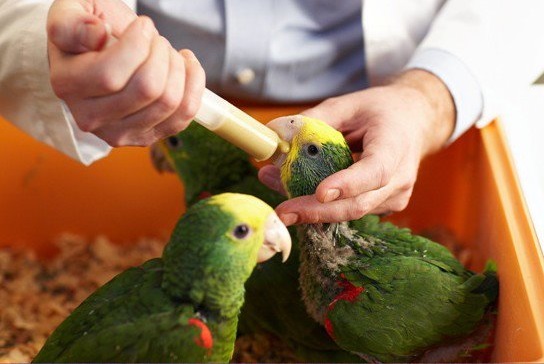
|
|
|
Tags :
How To Hand Rear A Baby Parrot South Africa
|
|
|
|
18
NOV
2016
|
|
|
|
There is a lack of scientific study on avian nutrition, especially as it relates to different bird species, but most experts agree that a good diet for parrots begin with a formulated pellet diet with a variety of other foods added as supplements. A diet based primarily on seeds is deficient in many nutrients, including vitamin A and calcium, and is too high in fat.
This is not to say that seed do not have a place in avian diets, but many birds come to prefer them to the exclusion of other healthy choices and can be fussy when it comes to trying a varied diet. Some birds will even pick out a couple of favorites from a seed mix, which further reduces the nutritional balance in the diet. When it comes to parrot nutrition, consider seeds to be somewhat like junk food: birds love them, but they are not the healthiest choice.
For most species of parrot, seeds should only make up about 10 percent of the diet. Some species, like budgies and cockatiels are naturally seed eate.. [More]
|

|
|
|
Tags :
Bird Food South Africa , Parrot Seed South Africa , Parrot Food South Africa , Why Seeds Is Only 10% Of Bird's Diet South Africa , Corret Diet For Pet Birds South Africa
|
|
|
|
02
OCT
2016
|
|
|
|
When it comes to food, your pet needs a balanced diet as well as lots of clean water to stay in tip top shape. Feeding your bird correctly for maximum health has never been easier than it is now. For a long time, the standard way to feed pet birds was to buy a seed mix, and possibly supplement the seeds with some fresh greens and a piece of fruit. Most kinds of pet birds see seed mixes as tasty, but the mixes are fattening and lack many essential nutrients. As a result, many pet birds died young from preventable diseases.
In the past couple of decades, research into avian nutrition has made huge strides. This research has resulted in excellent pellet foods and ready-to-serve mixes for many species of bird, which will help ensure a long healthy life for your pet. But while it may be convenient to know exactly what nutrients our pets are consuming, many parrots look upon commercial pellets with disdain. And because pellets can be consumed far more quickly that seeds, parrots.. [More]
|

|
|
|
Tags :
Seeds Vs Pellet DietsFor Birds South Africa , Parrot Diet & Enrichment South Africa , Are Pellets or Seeds Better for Parrots South Africa
|
|
|
|
16
SEP
2016
|
|
|
|
For decades the standard diet for most birds kept in captivity has been a mixture of seeds and nuts. This diet was based on the assumption that this is what these birds eat in their natural environment. Over the past several years more information about what these birds actually eat in the wild as well as research on their actual nutritional requirements has become available. This new information coupled with better documentation of avian health problems by veterinary and aviculture professionals has made it clear that these diets are harmful; however many people continue to feed these seed and nut based diets without proper supplementation. Further, proper supplementation may be hard to achieve. Supplements like mineral blocks, cuttle bones, fortified seeds, and vitamins in the water rely on the bird’s willingness to choose the appropriate things to eat and in the proper quantities. Birds typically eat to fulfill an energy (calorie) requirement and will choose the highest energy.. [More]
|
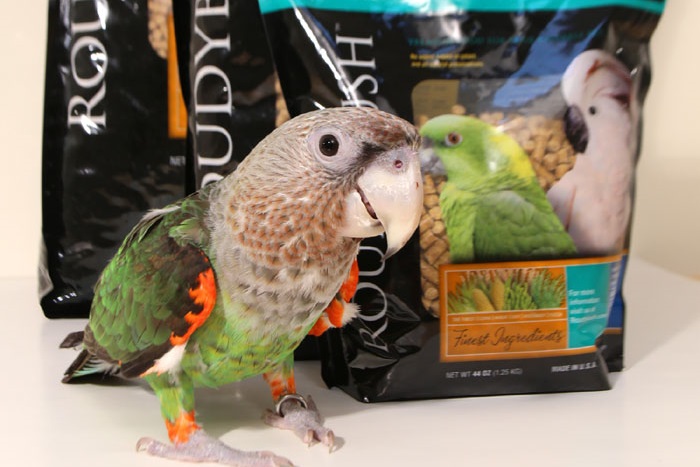
|
|
|
Tags :
What makes Roudybush the best diet for your bird South Africa
|
|
|
|
07
AUG
2016
|
|
|
|
Although seeds are a convenient and affordable option when it comes to feeding your pet bird, they actually aren’t the best in terms of nutrition, and feeding a diet made up exclusively of seeds can result in a number of health problems, including cardiovascular issues and malnutrition, in the long run. Obesity and fatty liver disease is also caused by feeding too much seeds. This disease causes large amounts of fat to be deposited in the liver which eventually loses the ability to function properly. This serious condition is most common in Cockatoos, Cockatiels, Budgies, Amazons, Lovebirds, and Quakers.
It’s All About Variety and Whole Foods
When it comes to avian care and nutrition, things are more complicated than they appear on the surface, and while you may have thought that purchasing seeds from your local pet store was enough to keep your feathered friend happy and healthy, the truth is your bird’s diet should contain a lot more variety in or.. [More]
|
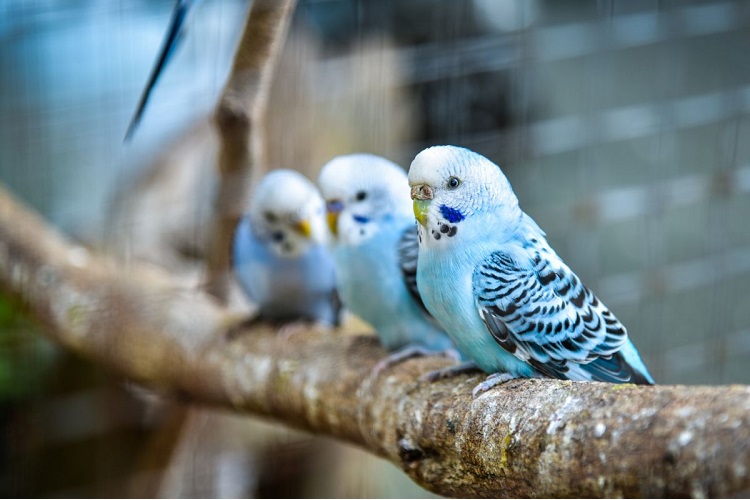
|
|
|
Tags :
Problem with Feeding Birds an All-Seed Diet South Africa
|
|
|
|
26
JUN
2016
|
|
|
|
We live in a land of fast food, fatty snacks, and junk food junkies. French fries dripping with grease, hamburgers packed with calories – most of us are painfully aware that our diets are less than ideal. Could our pets also be suffering from a similar situation? If that pet is a bird and it's on an all-seed diet, the answer's an emphatic “Yes!”
While nature lovers can safely supplement wild birds with feeders full of seed, too much seed for your pet bird can lead to serious problems. Just ask Dr. Vanessa Rolfe, an avian veterinarian at Avian & Exotic Veterinary Services in Salem, Va. “Seventy to 80 percent of the problems I treat in birds are due directly or indirectly to inadequate diets – usually seed-based diets,'' Rolfe says. “Seeds are high in fat and deficient in many other nutrients, including amino acids, vitamins, and minerals. So an all-seed diet can be associated with a long list of medical problems.”
These p.. [More]
|
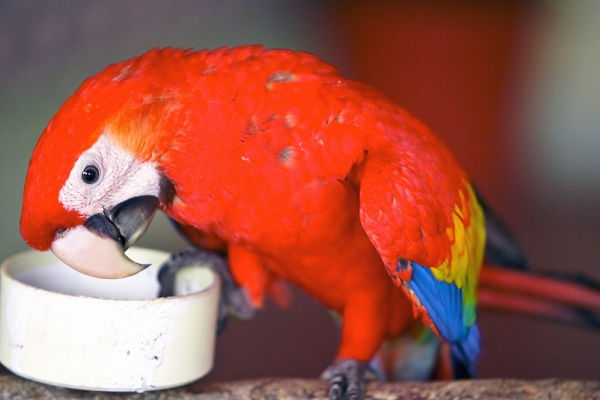
|
|
|
Tags :
Birds Need More Than Seeds South Africa , Roudybush Bird Diet South Africa
|
|
|
|
20
SEP
2014
|
|
|
|
The Pet Food Industry Association of Southern Africa (PFI) has vowed to eliminate petfood fraud and protect South African pet owners from "rogue petfood manufacturers." Consumers can do their part by only buying commercial petfood that has a "V" number followed by "Act 36 of 1947" on its packaging. This indicates that the food has been registered by its manufacturer or distributor. “It is absolutely critical for pet owners to ensure that the food they purchase is registered with the department, as this is the only way to ensure that the minimum nutritional standards are met and that the food has been examined to ensure this, and, further, that your pet is getting the best possible and safe food for them,” said PFI Executive Director Barry Hundley.
Pet Habitat is pleased to announce that all Burgess Excel Nuggets and Roudybush bird pellets have been approved and are registered with Department of Agriculture. It was not easy since w.. [More]
|
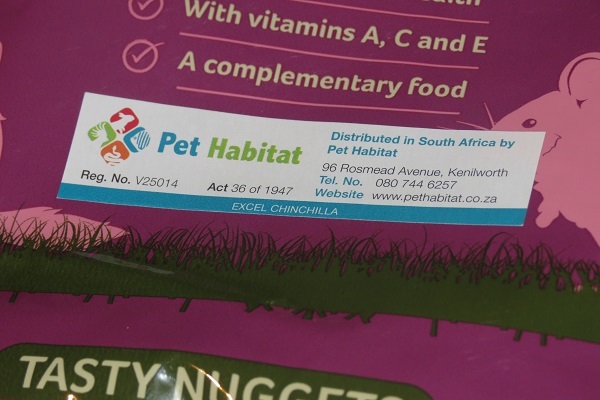
|
|
|
Tags :
Buy Only Registered Pet Food In South Africa
|
|
|
|
26
JUL
2014
|
|
|
|
Nutrition is the watchword for taking care of your bird. A balanced diet is a necessity to allow a bird to live a full and healthy life. An unbalanced diet is the main cause of disease and early death in pet birds. Malnutrition is a human-made disease. Fortunately, it is also treatable by changing the diet.
For most pet birds, a balanced diet consists of 65-80% formulated diet, about 15-30% vegetables, and the rest can be fruits and nuts. Some species such as lories and hyacinth macaws have very special dietary needs. Be sure to consult with your avian veterinarian to know what diet is best for your bird. If your bird is currently eating a seed-based diet as her primary source of nutrition, it is a good idea to convert her to a formulated diet.
Feeding your bird correctly is not difficult, but knowing when and how to switch from a not-so-healthy diet to one that has optimum nutrition takes some know-how. We have compiled a host of tips we recommend in order to switch .. [More]
|
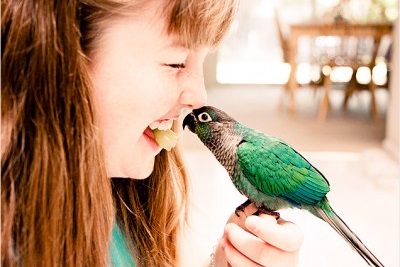
|
|
|
Tags :
Switching Your Bird's Diet , Roudybush Bird Diet , Bird Food South Africa , Buy Bird Pellets South Africa , Bird Seed South Africa , Parakeet Food South Africa , Budgie Food South Africa , African Grey Food ,
|
|
|
|
12
JUL
2014
|
|
|
|
All-seed diets for pet birds, including parakeets, is something that has long been debated and it is a hot topic when it comes to bird care. While many birds are raised on all-seed diets, it should be noted that this is not good for your bird and may lead to many health issues down the line. Not only are seeds very high in fat but they are also not an adequate source of vitamins and minerals for your pet bird.
Parakeets need more balanced nutrition than an all-seed diet can provide. A wide variety of healthy human foods, as well as formulated pellets are recommended for the parakeet diet, as they offer a wide spectrum of nutrients and a balanced alternative to seed diets. If your bird is a “seed junkie,” it’s important to consult your local avian vet for tips and tricks to help you transition your pet to a healthier diet. Proper bird care is crucial and it is of the utmost importance to know that you cannot simply switch your bird from seed to something e.. [More]
|
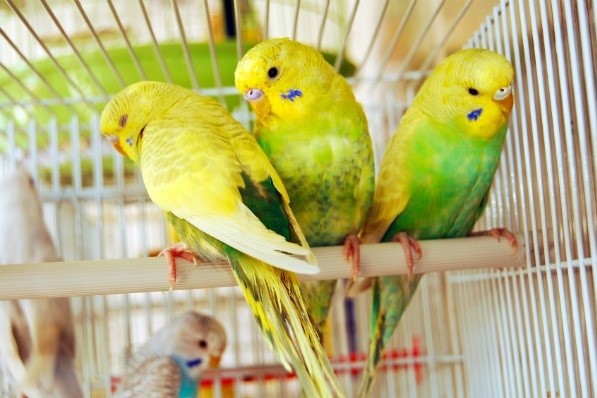
|
|
|
Tags :
Why Bird Seed Diets Are Bad For Parakeets , Bird Food South Africa , Parakeet Diet South Africa , Feeding Pet Birds South Africa , Budgie Food South Africa , Feeding Parakeets in South Africa
|
|
|
|
26
JUN
2014
|
|
|
|
Just as people are becoming increasingly aware of how many preservatives, hormones, synthetic dyes and chemicals are present in many conventional food sources, and how detrimental they can be to human health, so are they realizing that synthetic chemicals are not good for their beloved pets, either. The health craze that has been sweeping the modern world hasn’t stopped at human food. Your veterinary technician will agree: high quality pet food is worth the price.
People need healthful, nutrient-rich food with plenty of vitamins and minerals and as few chemicals and “fillers” as possible for long life and an overall sense of well-being. So does your pet. High quality pet food usually costs a bit more because rather than using cheap, empty ingredients, quality pet food is packed with protein-rich nutrition, with natural rather than chemical preservation. If you can afford it, buying high quality types of pet food is altogether worth the money for the benef.. [More]
|
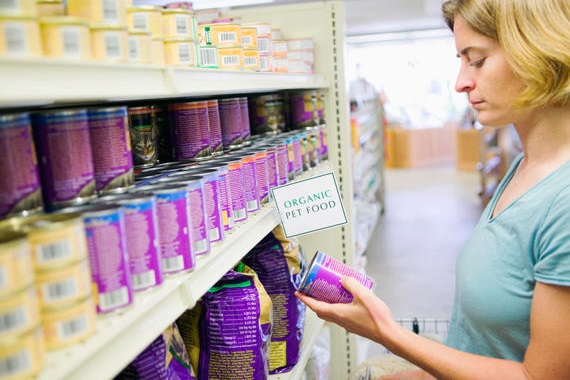
|
|
|
Tags :
Avoiding Bad Ingredients In Small Animal Petfood , Dangerous Preservatives in Guinea Pig Food , Bad Ingredients in Chinchilla Food , Ingredients To Avoid In Rabbit Food , Avoiding Bad Pet Food Ingredients
|
|
|
|
|
|
Category List
|
|
|
|
|
|
Archive List
|
2025 2023 2022 2021 2020 2019 2018 2017 2016 2015 2014 |
|
|